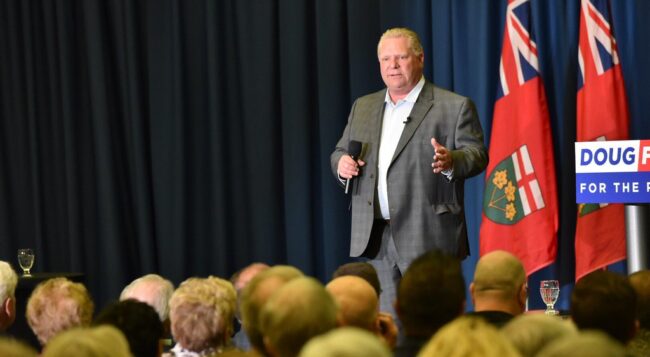Originally published in the Toronto Star
Ontario Premier Doug Ford was just handed a political gift by the Supreme Court — if he’s willing to take it.
This week, the court ruled against legal challenges waged by the Ontario and Saskatchewan provincial governments, hoping to kill the federal carbon tax and rebate. The court ruled 6-3 that the carbon tax is constitutional.
Ford probably isn’t celebrating the loss, but he should be. Where he once found himself boxed into an anti-carbon-tax corner, he’s now been liberated by the Supreme Court. Now he has an opportunity to develop a climate policy that is popular with the public — and ironclad reasoning to offer anyone from his base who might disagree.
Carbon pricing is popular in Ontario. Fighting it isn’t. A poll of Ontarians conducted in February by Leger on behalf of Clean Prosperity found that two-thirds of Ontarians — and two-thirds of PC voters — support a federal carbon tax that returns the proceeds to Canadians. And last year, almost two-thirds of potential Conservative voters that Clean Prosperity surveyed in the critical 905 swing ridings said they oppose the use of taxpayer dollars to fight the carbon tax.
As he promised, Ford fought valiantly against the tax, but that fight is now over. The Supreme Court decision has placed him at a fork in the road. He can continue to resist — futilely — what is now a fait accompli, or he can admit defeat graciously, rise above partisanship and come up with a winning Conservative climate policy that includes carbon pricing.
After all, why allow Prime Minister Justin Trudeau to curry favour with his constituents by paying them a steadily rising federal carbon tax rebate, when Ford can chart his own path on Conservative climate action and use the carbon tax revenues as he sees fit?
Carbon pricing delivers a lot of revenue. By next year, the carbon tax will generate almost $5 billion in proceeds for Ontario. Trudeau’s program would issue a $718 rebate to an Ontario family of four in 2022. Revenues, and federal rebate payments, will grow even faster when the price of carbon starts increasing by $15 a tonne beginning in 2023.
Ford could make his own choices about where to direct Ontario’s carbon tax revenue, as long as he sticks to the minimum price on carbon pollution. He could pay for his entire proposed 20 per cent income tax cut with carbon tax money. In fact, he could afford to double the size of this tax cut and still have $250 million left over — all from carbon tax proceeds — to spend on priorities like support for small businesses affected by the pandemic, assistance to rural residents, help for low-income Ontarians who will see less benefit from his tax cuts or reducing the deficit.
Cutting income taxes is smart policy and it fits with the premier’s policy agenda. Studies show that income tax cuts would do more to boost economic growth than the federal rebates. Yes, it means Ford would have to accept a carbon tax but, if he’s committed to fighting climate change, it’s the lowest-cost option he has available.
Ford voters would support a carbon tax that is used to cut income taxes. Our polling suggests that almost two-thirds of PC voters would support this approach, and that 30 per cent would actually be more likely to vote for the party if it combined carbon pricing with income tax cuts. Only five per cent said this policy would make them less likely to vote Conservative. That should put to rest any concerns that Ford would be penalized by his base for implementing an Ontario carbon tax. If anything, the policy is a net vote winner.
Ford’s popularity took a hit during the second wave of the pandemic. Now he has an opportunity to improve his image as a leader capable of protecting Ontarians from the looming threat of climate change by moving past the partisan fight on carbon taxes.
Donning the mantle of a statesman has served him well in the past; the premier earned widespread praise for his willingness to work with the federal government on the pandemic response, NAFTA and transit funding. Ford can again show that he’s strong enough to stand up to the federal government, but not so partisan that he won’t work with them. All he has to do is devise a made-in-Ontario version of a federal policy that’s already in place.
If he can find his way to a Conservative version of carbon pricing, he’ll get access to billions of dollars and an opportunity to generate public support, right before an election. Doesn’t that sound like a better deal than allowing the federal Liberals to keep sending all that rebate money to Ontarians?








